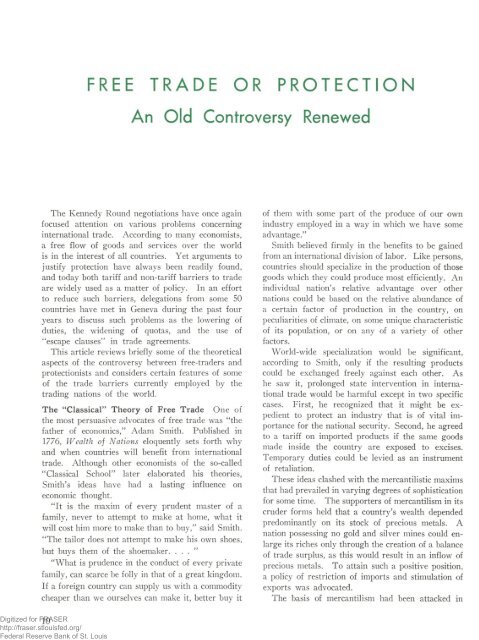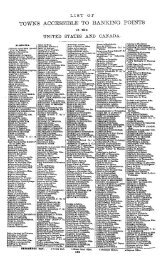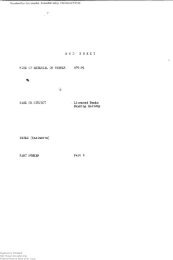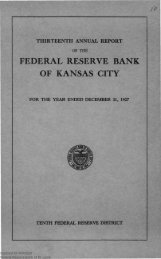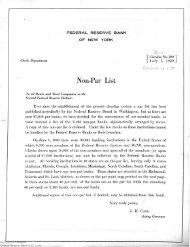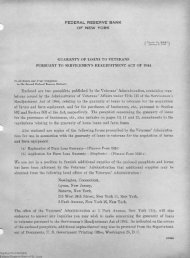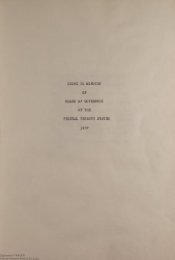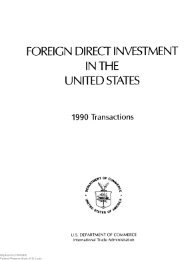Download File (6.3M) - Fraser - Federal Reserve Bank of St. Louis
Download File (6.3M) - Fraser - Federal Reserve Bank of St. Louis
Download File (6.3M) - Fraser - Federal Reserve Bank of St. Louis
You also want an ePaper? Increase the reach of your titles
YUMPU automatically turns print PDFs into web optimized ePapers that Google loves.
10<br />
Digitized for FRASER<br />
http://fraser.stlouisfed.org/<br />
<strong>Federal</strong> <strong>Reserve</strong> <strong>Bank</strong> <strong>of</strong> <strong>St</strong>. <strong>Louis</strong><br />
FREE TRADE OR PROTECTION<br />
An Old Controversy Renewed<br />
The Kennedy Round negotiations have once again<br />
focused attention on various problems concerning<br />
international trade. According to many economists,<br />
a free flow <strong>of</strong> goods and services over the world<br />
is in the interest <strong>of</strong> all countries. Yet arguments to<br />
justify protection have always been readily found,<br />
and today both tariff and non-tariff barriers to trade<br />
are widely used as a matter <strong>of</strong> policy. In an effort<br />
to reduce such barriers, delegations from some 50<br />
countries have met in Geneva during the past four<br />
years to discuss such problems as the lowering <strong>of</strong><br />
duties, the widening <strong>of</strong> quotas, and the use <strong>of</strong><br />
“ escape clauses” in trade agreements.<br />
This article reviews briefly some <strong>of</strong> the theoretical<br />
aspects <strong>of</strong> the controversy between free-traders and<br />
protectionists and considers certain features <strong>of</strong> some<br />
<strong>of</strong> the trade barriers currently employed by the<br />
trading nations <strong>of</strong> the world.<br />
The “ Classical” Theory <strong>of</strong> Free Trade One <strong>of</strong><br />
the most persuasive advocates <strong>of</strong> free trade was “ the<br />
father <strong>of</strong> economics,” Adam Smith. Published in<br />
1776, Wealth <strong>of</strong> Nations eloquently sets forth why<br />
and when countries will benefit from international<br />
trade. Although other economists <strong>of</strong> the so-called<br />
“ Classical School” later elaborated his theories,<br />
Smith’s ideas have had a lasting influence on<br />
economic thought.<br />
“ It is the maxim <strong>of</strong> every prudent master <strong>of</strong> a<br />
family, never to attempt to make at home, what it<br />
will cost him more to make than to buy,” said Smith.<br />
“ The tailor does not attempt to make his own shoes,<br />
but buys them <strong>of</strong> the shoemaker. . . . ”<br />
“ What is prudence in the conduct <strong>of</strong> every private<br />
family, can scarce be folly in that <strong>of</strong> a great kingdom.<br />
If a foreign country can supply us with a commodity<br />
cheaper than we ourselves can make it, better buy it<br />
<strong>of</strong> them with some part <strong>of</strong> the produce <strong>of</strong> our own<br />
industry employed in a way in which we have some<br />
advantage.”<br />
Smith believed firmly in the benefits to be gained<br />
from an international division <strong>of</strong> labor. Like persons,<br />
countries should specialize in the production <strong>of</strong> those<br />
goods which they could produce most efficiently. An<br />
individual nation’s relative advantage over other<br />
nations could be based on the relative abundance <strong>of</strong><br />
a certain factor <strong>of</strong> production in the country, on<br />
peculiarities <strong>of</strong> climate, on some unique characteristic<br />
<strong>of</strong> its population, or on any <strong>of</strong> a variety <strong>of</strong> other<br />
factors.<br />
W orld-wide specialization would be significant,<br />
according to Smith, only if the resulting products<br />
could be exchanged freely against each other. As<br />
he saw it, prolonged state intervention in international<br />
trade would be harmful except in two specific<br />
cases. First, he recognized that it might be expedient<br />
to protect an industry that is <strong>of</strong> vital importance<br />
for the national security. Second, he agreed<br />
to a tariff on imported products if the same goods<br />
made inside the country are exposed to excises.<br />
Temporary duties could be levied as an instrument<br />
<strong>of</strong> retaliation.<br />
These ideas clashed with the mercantilistic maxims<br />
that had prevailed in varying degrees <strong>of</strong> sophistication<br />
for some time. The supporters <strong>of</strong> mercantilism in its<br />
cruder forms held that a country’s wealth depended<br />
predominantly on its stock <strong>of</strong> precious metals. A<br />
nation possessing no gold and silver mines could enlarge<br />
its riches only through the creation <strong>of</strong> a balance<br />
<strong>of</strong> trade surplus, as this would result in an inflow <strong>of</strong><br />
precious metals. T o attain such a positive position,<br />
a policy <strong>of</strong> restriction <strong>of</strong> imports and stimulation <strong>of</strong><br />
exports was advocated.<br />
The basis <strong>of</strong> mercantilism had been attacked in


